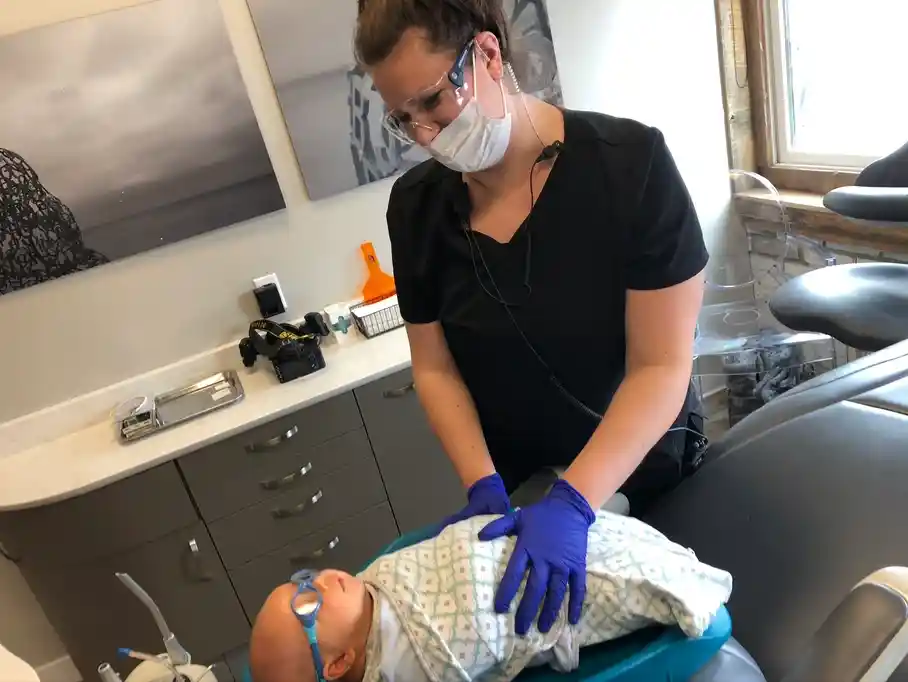Tongue-tie or “ankyloglossia” is a condition restricting a person’s ability to move and lift their tongue properly. Because it restricts the tongue’s range of motion, it can lead to issues with breastfeeding, feeding, talking, kissing, or more, making it difficult for a baby (or adult) to thrive. A common question people have about tongue-tie is does a tongue-tie go away on its own? Here we explain more about tongue-tie and why it is important to seek treatment with a tongue-tie procedure as soon as possible.
How Can I Tell If I or My Child Has a Tongue-Tie?
Some common signs to watch for to determine if you or your child has a tongue-tie include:
- Poor latch quality/difficulty maintaining latch
- Colic, reflux symptoms, excessive gassiness, spitting up, or hiccups
- Difficulty with milk transfer/poor weight gain/failure to thrive
- Frustration at the breast
- Mouth breathing or snoring
- Falling asleep at the breast and short sleep episodes
- Frequent/extended nursing cycles
- Clicking, gumming/chewing of the nipples
- Choking, gulping, gasping at the breast
- Leaking milk from the corners of mouth/improper seal
- Inability to flange upper or lower lips
- White coating on the tongue
Some common signs in adults include difficulty:
- Speaking
- Eating
- Drinking
- Breathing
- Kissing
For infants, it is harder to tell if they have tongue-tie. If you are having difficulty feeding your baby, you can lay your baby on their back and gently feel under their tongue. It should be able to lift up easily and the frenulum should be quite thin.
What is a Tongue-Tie?
Tongue-tie is caused by either a short, thick or tight band of tissue that keeps the tongue attached to the bottom of the mouth. As a result, the tongue doesn’t have its full range of motion. In most cases, by the time a baby is born, the “lingual frenulum” separates. However, it isn’t always what happens. For some people, the tongue isn’t released and is instead restricted from birth. Although the reason this happens is unknown, it is believed genetic factors can increase the risk.
Does a Tongue-Tie Go Away Over Time?
Unfortunately, without treatment, tongue-tie won’t go away on its own. Studies show the connective tissue causing the tongue-tie is very resistant to stretching or even tearing. This is because it is made up of Type 1 collagen, which is quite strong.
Does a Tongue-Tie Stretch Out Over Time?
This is another common question people have about tongue-tie. Unfortunately, the answer is still no. As mentioned above, the Type 1 collagen that makes up the frenulum is just too tough to respond to stretching. It quite stubbornly remains in place, tight and unmoving. Therefore, tongue-tie procedures are required to correct tongue-ties.
When a tongue-tie is the problem, we recommend a tongue-tie release (a frenectomy), a speedy procedure that allows for more mobility and freedom to grow and function. Dr. Turner uses a LightScalpel CO2 laser for tongue- and lip-tie release procedures.
The LightScalpel CO2 laser is a device that produces a concentrated beam of light. A laser dentist uses a highly focused CO2 laser beam to vaporize, cleanly and precisely, while sealing blood vessels at the same time.
What are Possible Side Effects of Tongue-Tie?
Babies and adults alike can have tongue-tie, and the side effects differ by age.
Babies can experience feeding problems because they are unable to latch on and suck properly. This not only puts your baby at risk for inadequate nutrition but also interferes with their ability to thrive. The breastfeeding mother can also experience pain when their baby is feeding, which creates stress for both baby and mother.
If treatment is not provided in the early days, children can experience difficulty learning to speak and pronounce certain letters. People with tongue-tie also experience issues with oral hygiene as the tongue doesn’t have the proper range of motion which can keep debris in the mouth and cause tooth decay and gum disease.
If you believe you or your child has a tongue-tie, or if you simply aren’t sure, schedule a consultation or virtual appointment with Dr. Liz Turner so she can assess your unique situation.






